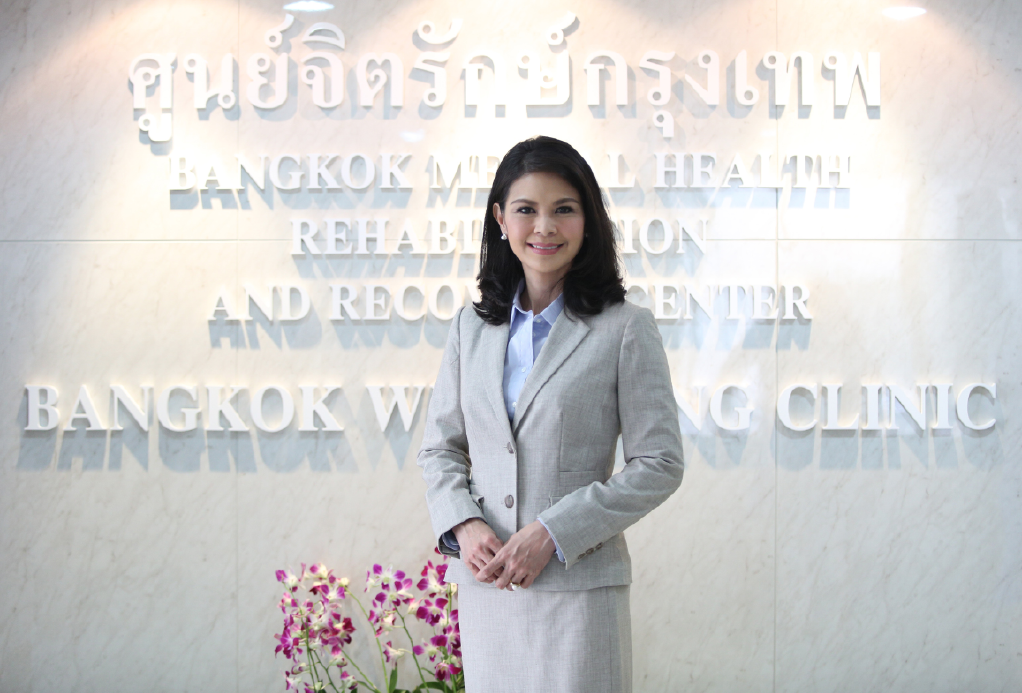By Scott Murray
| AFTER graduating from medical school, Apisamai ‘Birth’ Srirangsan found herself with three months to wait before the start of her residency training. To fill in time, her high school teacher encouraged Birth to enter the Miss Thailand Universe contest. She ended up winning the crown, and subsequently represented this country in the 1999 Miss Universe beauty pageant, held in Trinidad Tobago. Today, Birth is a trained psychiatrist and Director of Bangkok Hospital’s Mental Rehabilitation and Recovery Center (BMRC). It’s clearly been an unusual but interesting journey for this delightful Bangkok-based lady. Growing up in Nakhon Pathom, she dreamed of being like Porntip ‘Bui’ Nakhirunkanok, Thailand’s popular Miss Universe winner in 1988. Little did she think she’d eventually emulate her idol. |
From school at Satri Witthaya high, Birth went directly to medical school, deciding she had a better chance of making a career as a doctor than as an artist, her other career choice. But she didn’t enjoy her first two years of medical study and told her mother that she wanted to be a social worker instead.
Her mother encouraged her to stick with it, and in her fourth year, she started to see patients when she was posted to Khon Kaen University, a nine-hour drive from Bangkok. This was before the government’s health insurance reform, so poor people who were ill couldn’t afford to pay for many health services.
Birth was deeply affected by these people, who seemed to care less about their pain than what would happen to their families and how they could pay their bills. There was one particular incident where a child and her family were resigned to the young girl’s death because they couldn’t afford an appendectomy; Birth’s mother stepped in and paid the bill.
While in Khon Kaen, Birth began to notice psychiatrists working with late-stage cancer and AIDS patients, making them smile, talking to them about issues like politics and the environment. “Just through talking, without any equipment, they were fixing violent patients, suicidal patients, patients without hope, families who couldn’t talk to anyone else because of the sensitive nature of the problems they were dealing with. They were making a difference through communication,” Birth recalls.
So in her fifth year of residency Birth decided she wanted to be a psychiatrist, even though her supervisor tried to talk her out of it saying she could make more money as a neurosurgeon or a dermatologist, and that society’s perceptions of psychiatrists are that they are “weird” and that after a while she would get bored with it. But she persisted.
Thailand admits only 20 new psychiatrists a year to its residency program and each resident has three supervisors, or practicing psychiatrists. Birth estimates there are only 400 psychiatrists for a country of 60 million plus.
Birth grew up as a tomboy. In grade six, only two boys in the school were bigger than her, so when her classmates had trouble with bullies they turned to her for help. Birth’s reputation as protector continued through medical school.
She didn’t pay much attention to make-up or dressing up, so the Miss Universe pageant turned her life around. It proved a huge adjustment, involving a great amount of stress. There were doubts as to how capable a psychiatrist a beauty queen could be. There was even a live TV show where people could vote on whether Dr Birth should be a psychiatrist, or not. Luckily, she received lots of support from friends, family, the Department of Mental Health and Khon Kaen University.
Her mother encouraged her to stick with it, and in her fourth year, she started to see patients when she was posted to Khon Kaen University, a nine-hour drive from Bangkok. This was before the government’s health insurance reform, so poor people who were ill couldn’t afford to pay for many health services.
Birth was deeply affected by these people, who seemed to care less about their pain than what would happen to their families and how they could pay their bills. There was one particular incident where a child and her family were resigned to the young girl’s death because they couldn’t afford an appendectomy; Birth’s mother stepped in and paid the bill.
While in Khon Kaen, Birth began to notice psychiatrists working with late-stage cancer and AIDS patients, making them smile, talking to them about issues like politics and the environment. “Just through talking, without any equipment, they were fixing violent patients, suicidal patients, patients without hope, families who couldn’t talk to anyone else because of the sensitive nature of the problems they were dealing with. They were making a difference through communication,” Birth recalls.
So in her fifth year of residency Birth decided she wanted to be a psychiatrist, even though her supervisor tried to talk her out of it saying she could make more money as a neurosurgeon or a dermatologist, and that society’s perceptions of psychiatrists are that they are “weird” and that after a while she would get bored with it. But she persisted.
Thailand admits only 20 new psychiatrists a year to its residency program and each resident has three supervisors, or practicing psychiatrists. Birth estimates there are only 400 psychiatrists for a country of 60 million plus.
Birth grew up as a tomboy. In grade six, only two boys in the school were bigger than her, so when her classmates had trouble with bullies they turned to her for help. Birth’s reputation as protector continued through medical school.
She didn’t pay much attention to make-up or dressing up, so the Miss Universe pageant turned her life around. It proved a huge adjustment, involving a great amount of stress. There were doubts as to how capable a psychiatrist a beauty queen could be. There was even a live TV show where people could vote on whether Dr Birth should be a psychiatrist, or not. Luckily, she received lots of support from friends, family, the Department of Mental Health and Khon Kaen University.
Birth realizes she was thrown into the fire back then in order to test her mettle. Today, when screening mental health care workers, she doesn’t only look for intelligent doctors, but kind and tolerant physicians and professionals as well.
The BMRC has been open for two years. Before that Birth worked for 10 years at the Department of Mental Health. She says that mental health services are limited in Thailand due to the lack of psychiatrists and proper care facilities. Some psychiatric hospitals have 1,000 beds, some shunted right next to each other, so there’s little privacy and only a few attending doctors.
She compares some of these hospitals to the asylums in the West decades ago. Birth says Thailand has done well with mental health rehabilitation using agricultural activity, exercise and occupational therapy to help people regain their mental health.
Working at a public hospital, Birth sees up to 30 patients a day, each for only a few minutes at a time, so the best she can do is to give them a diagnosis, dispense medication and warn of any side-effects. She doesn’t have time to talk to the patients about other important issues affecting their mental state such as abuse by a husband, or a son’s drug addiction, or financial problems. Birth often visits hospitals on the weekend so she can spend more time with her patients.
Birth also worked at Srithanya Psychiatric Hospital (formerly known as Nonthaburi Mental Hospital), the biggest psychiatrist hospital in the country. Patients’ homes could be hundreds of kilometers away, so the family was not always present during treatment. If the patient showed any violent tendencies, the family were sometimes reluctant to take them back, not knowing how to care for them properly.
Says Birth: “Medication alone isn’t the answer, you need rehabilitation, pyscho-social intervention, family education – the family has to be part of the care.”
In 2007, Birth took a Fellowship with the University of Toronto and was posted to the Ontario Shores Centre for Mental Health Sciences in Whitby, whose director Peter Prendergast has a close relationship with the Thai Department of Mental Health. Birth’s team at Ontario Shores included a Somali psychiatrist, a pharmacist from Iran and a psychologist from Hong Kong, well-representing Toronto’s multi-ethnicity.
Birth modeled the BMRC after the program she interned with in Canada.
Reflecting on her time in Canada, Birth says: “Knowledge is everywhere, but you must find someplace you can live easily and have good friends. I found that in Canada; the people were lovely. Toronto has a strong Asian connection, and I consider it my second home.”
Returning to Thailand, Birth once again faced the problems she had encountered while working at public psychiatric institutions. Families weren’t given the opportunity to care for their loved ones suffering from mental illness.
In Canada, she experienced the ‘Recovery Model’ in which every patient is treated with respect moving towards their goal. “It’s not just about focusing on symptom management (such as insomnia, depression and hearing voices),” she says. “It’s more about focusing on a patient’s strengths and achievements.
“Many patients have given up hope, they have no self-esteem. Rather than asking them about their pain and how much cocaine they’ve used this week, we ask them who they are and what their dreams are. When the practitioner shows hope in the patient, it helps patients to believe in themselves.”
At Bangkok Hospital, Birth has access to psychologists, psychotherapists, social workers, occupational therapists, music therapists as well as drama and movement therapists, many of whom have studied abroad. Many mental health specialists in the region can only dream about that kind of support.
Initially working alone at BMRC, Birth now has five full-time and 15 part-time psychiatrists. She also has one full-time psychologist, three part-time, as well as a part-time drama therapist, music therapist and occupational therapist.
She stresses the BMRC is geared towards helping people who want more than having to wait four hours to talk to a psychiatrist for five minutes. The BMRC plays a key role in overall hospital care as it can provide comfort for a whole range of patients suffering from mental anxiety over a terminal disease, a disabling injury or the loss of a loved one.





















